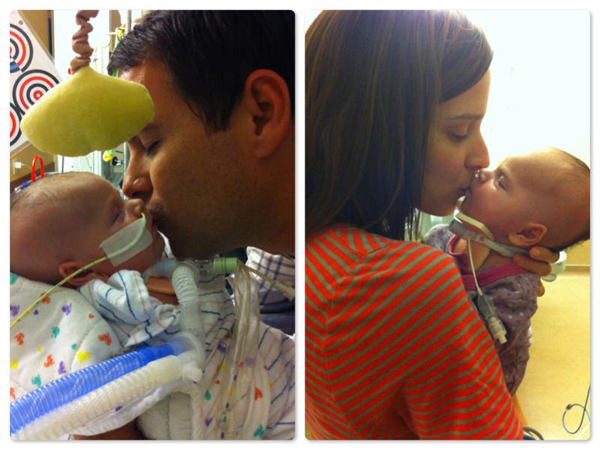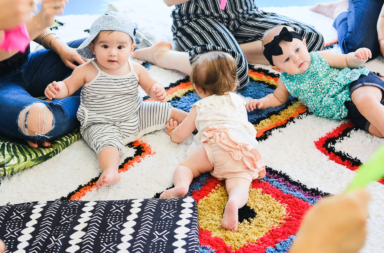Do512 Family Featured Babymakers, Claire and Lauren from M.I.L.K. (Moms I’d Like to Know), recently interviewed local mother, Lani Ripple. Ripple’s daughter was born with a Congenital Heart Defect. This is her story.
_________________________________________________
In honor of Congenital Heart Defect Awareness Week, (Feb. 7 – 14) we’re bringing you the story of our long time friend, Lani DeGuire Ripple. Her daughter was born four months ago with a CHD and, since then, Lani has done everything she can to educate herself on her little girl’s condition. She was kind enough to share her experience with us- the good, the bad and the ugly- in an effort to put the spotlight on CHDs.
HAVE YOU ALWAYS KNOWN YOU WANTED TO BE A MOM? I think I always kind of assumed that I’d be a mom someday, but I didn’t give it much thought in my younger years. Once we started trying (and trying and trying) to have a baby, the desire definitely grew stronger.
WAS CONCEIVING EASY FOR YOU? Oops, I gave my answer away in the previous question. I didn’t take fertility drugs or have any treatments or anything, but it did take a while to get pregnant- both times. I don’t tell many people about this (so why not start on the Internet?), but we actually lost a baby at 13 weeks during the summer of 2011. The baby had a very rare chromosomal abnormality, and the pregnancy simply wasn’t viable. It was devastating, and I remember thinking “this is the hardest thing I’ll probably ever go through.” Turns out I was wrong. Just so there’s no confusion, our first baby’s rare condition and Nina’s rare condition are completely unrelated. It seems lightning really does strike twice sometimes.
HOW MANY WEEKS PREGNANT WERE YOU WHEN YOU FOUND OUT THE BABY INSIDE YOU HAD A HEART DEFECT? I was so scared to have my first-screen appointment the second time around. But when the baby passed with flying colors at 12 weeks, I figured I was in the clear. 7 weeks later at the anatomy scan, we were yammering about how surprised we were that it was a girl when I noticed the technician was spending a little too much time looking at the baby’s heart. Eventually she said, “I’m not seeing what I need to. I’m going to refer you to a specialist.” It was hauntingly familiar. Four hours later, we had the diagnosis. Nina has a Congenital Heart Defect called Hypoplastic Right Heart Syndrome (HRHS). Basically the right side of her heart (the side that pumps blood to the lungs) hadn’t formed properly.

TELL US A LITTLE ABOUT CONGENITAL HEART DEFECTS – HOW THEY’RE DIAGNOSED, HOW THEY’RE TREATED, ETC. CHDs are so varied, and treatment plans differ. I am no expert in CHDs, but I do know that 1 in every 100 babies born has a congenital heart defect. In the US, twice as many children die from CHDs each year than from all forms of childhood cancer combined. Nina’s defect is extremely rare – the chance of getting HRHS is more like 1 in 20,000. However, operating under the assumption that “it won’t happen to my baby” is potentially deadly. There are simple, non-invasive tests that can be done to determine whether your baby is the 1 in 100. First, ask for an anatomy scan 1/2 way through your pregnancy, and make sure they look for proper heart formation. It’s just a sonogram done by someone who knows what to look for. Second, once your baby is born, PLEASE ask them to put a pulse oximeter on your baby to test the saturation levels in their blood. It’s painless, quick, easy and could literally save your baby’s life. Too many parents take their baby home and discover that there’s a problem when it’s too late. Knowing as soon as possible is best, so you can prepare for the proper team, care and interventions once it’s born.
THESE DAYS IT’S CLEAR HOW MUCH OF A FIGHTER NINA IS, BUT WERE THERE DOUBTS IN THOSE FIRST FEW DAYS/WEEKS ABOUT HER SURVIVAL? Seeing your baby after heart surgery is gut wrenching. She was so swollen and had so many machines and tubes connected to her. Nothing can really prepare you for that or for the roller coaster of emotions and events that follow. There were (and still are) many doubts about her lifespan. Fighter or not, Nina’s future with us is not secured. It’s a bummer thing to say, but the truth is, no baby is guaranteed a long and happy life. We could go through all of this with her and lose her to a drug overdose when she’s 17. Life is uncertain. We just happen to know, for certain, one enormous obstacle she has – and we’ll navigate it as best we can every day she’s with us.
HAVE YOU GONE BACK TO WORK? I had to return to work 12 weeks after she was born. It’s a hard transition for all moms, but knowing that your baby is still in the hospital added an extra special layer of mom guilt. It really helps that my mom is there with her when we’re at work. She just does all that shmoopy grandma stuff she’s supposed to do and keeps me informed of hospital shenanigans. It’s hard to focus on work sometimes, but my paycheck and my insurance are more important than ever. I’m actually able to apply my professional skills to my CHD-parent skills quite effectively. I’ve been a project manager for 13 years now, so I’m familiar with being the one constant on a project – the keeper of all information that can get lost along the way otherwise. Nudging nurses about the stuff they’re running late on, softly suggesting to doctors that they consider my latest theory, keeping track of deductibles, statements and Medicaid applications. It’s hard work, but Nina is definitely my best project to date.
 HOW HAS NINA’S CONDITION IMPACTED YOUR MARRIAGE? No one knows what I’m going through the way Sean does. He spends as much time with Nina at the hospital as I do, and I can’t imagine how much harder this would be without him. He’s amazing with her. Every kiss he gives her and every falsetto song he makes up for her makes me love him a little bit more. I think the thing that has impacted us the most is the fact that we’re still in the hospital. A family of 3 living in one room with hospital staff coming in/out at all times is rough, to say the least. Because it’s important to us that Nina not be surrounded by negativity, it forces us to speak to one another as kindly as possible and resolve issues and tensions quickly. There are definitely heated moments and dirty looks, but we remind ourselves regularly that Nina needs us and we need each other. We decided a while ago that our family word is perseverance. It’s written on our fridge at home. Not that we’re ever there to see it…
HOW HAS NINA’S CONDITION IMPACTED YOUR MARRIAGE? No one knows what I’m going through the way Sean does. He spends as much time with Nina at the hospital as I do, and I can’t imagine how much harder this would be without him. He’s amazing with her. Every kiss he gives her and every falsetto song he makes up for her makes me love him a little bit more. I think the thing that has impacted us the most is the fact that we’re still in the hospital. A family of 3 living in one room with hospital staff coming in/out at all times is rough, to say the least. Because it’s important to us that Nina not be surrounded by negativity, it forces us to speak to one another as kindly as possible and resolve issues and tensions quickly. There are definitely heated moments and dirty looks, but we remind ourselves regularly that Nina needs us and we need each other. We decided a while ago that our family word is perseverance. It’s written on our fridge at home. Not that we’re ever there to see it…
CAN YOU DESCRIBE YOUR LOWEST MOMENT SINCE NINA WAS BORN? The diagnosis was devastating. Being ready to be discharged on January 2, only to be sent back to the ICU the same day was cruel. But one day in particular comes to mind when I think of my low days. About 3 weeks past her first surgery, they did an exploratory bronchoscopy to see if there was any structural reason as to why Nina had been unsuccessful at coming off the ventilator. Since I thought we had a couple hours, we left to go vote. Right after I cast my ballot, the doctor called. Nina had bilateral vocal cord paralysis due to either a stretching or clipping of the vocal cord nerves that wrap around the heart and would require a tracheostomy in order to breathe on her own. I was sobbing at Highland Mall, surrounded by early voters. I did not see this coming. This wasn’t part of the 3-surgery plan I’d prepared for. I was furious and shocked and scared, and was yet again faced with the “wait and see” game, since we’d have to wait up to a year or more to know whether the cords were damaged permanently or if they’d heal in time. Every time the heart is operated on though, you run the risk of damaging these nerves again. It was another example of just how much of Nina’s outcome is out of my control.
CAN YOU DESCRIBE YOUR HIGHEST MOMENT SINCE NINA WAS BORN? As I mentioned, Nina was on a ventilator for weeks – I think close to 2 months in total, because we later learned that her diaphragm nerves were (temporarily) paralyzed as well. Seriously, we’re amazing at drawing the short straws. Holding her required 2 nurses to assist and about a million cords to manage. The day I got to hold her for the first time off the ventilator was huge for me. I was able to walk around the room with her when before we were bound to a chair. I could hold her upright in my arms instead of awkwardly cradled with a tube separating her face from mine. We cuddled and hugged and kissed and slow danced by her crib. It was the happiest I’d been since she was born.
DESCRIBE THE PERFECT DAY WITH YOUR DAUGHTER. Man. I think about having a normal, new mom day at home with Nina all. the. time. Just being Mom instead of being Nurse Mom. I think we’d start with a walk around Town Lake, with Nina in the stroller we have yet to use. Then we’d have friends and their kids over to our backyard to splash around in baby pools all day. I wouldn’t worry about germs or vitals or cords or whether she’s looking a little dusky. We’d take her to a restaurant at dinnertime and I wouldn’t have to lug a pulse ox, a suction machine or oxygen with us. I’d have a cocktail without fear of being too tipsy for end-of-day trach care. Nina would sleep (safely) in between us in bed and we’d take turns snuggling with her. We wouldn’t have a home nurse there, either, because we wouldn’t need one. We’d have privacy and happiness and normal baby chaos. I totally long for normal baby chaos.
DO YOU THINK YOUR AWESOME SENSE OF HUMOR HAS HELPED YOU THROUGH THIS? There are some mornings that we’re driving from the hospital to our house to get ready (at like 4:30 in the morning, mind you) and we’re cracking up about this or that and I think “How are we still talking to each other, let alone laughing?!” Humor is paramount. Blues needs balance. And we gotta lotta blues. So we better find chuckles from somewhere. Whether it’s the nurse’s bad breath or Nina’s hilarious farts. We have this new game we’re playing called Earworm where we just try to get terrible songs stuck in each other’s heads. And whoever comes up with the worst songs is the winner. I’m currently in the lead with “Lady” by Styx. But really, everyone loses.
 HAS YOUR PERCEPTION OF DOCTORS AND NURSES CHANGED THROUGH ALL OF THIS? What I know for certain is that good bedside manner and true empathy is a rarity, and when you get it, it makes a huge difference. We often wish we could encapsulate our experience (the fear, the exhaustion, the guilt, having to parent in public, etc.) and make all of Nina’s caregivers ingest just one dose of it. Their workplace is our awkward home, currently. Those who respect that sad reality are our faves.
HAS YOUR PERCEPTION OF DOCTORS AND NURSES CHANGED THROUGH ALL OF THIS? What I know for certain is that good bedside manner and true empathy is a rarity, and when you get it, it makes a huge difference. We often wish we could encapsulate our experience (the fear, the exhaustion, the guilt, having to parent in public, etc.) and make all of Nina’s caregivers ingest just one dose of it. Their workplace is our awkward home, currently. Those who respect that sad reality are our faves.
WHAT ITEMS HAVE YOU STOLEN FROM THE HOSPITAL WHEN NO ONE WAS LOOKING? I, uh…I don’t know what you’re, uh…what you’re talking about…
DO YOU HAVE ANY ADVICE FOR PARENTS WHO FIND THEMSELVES IN YOUR POSITION? Shoot, I’m still seeking advice myself! I guess I recommend reaching out to a community of people who are going through the same thing you are. But take their stories and advice with a grain of salt, since every diagnosis has its own nuances. Learn as much as you can and be the best advocate you can be for your baby. Ask a million questions. BE PRESENT. But definitely find a way to keep yourself sane. You’re no good to your baby if all you’re able to do is cry in their face all day long. Find fun. Sneak a beer in the hospital bathroom every once in a while. And don’t let nurses guilt you if you need to sleep in your own bed from time to time.
 ARE YOU ABLE TO THINK ABOUT ANYTHING ELSE OTHER THAN NINA? She’s obviously top of mind. I do try to remember that while this is the most important thing I’m doing right now, it’s good to find balance. You have to stay present in other areas of life. Whether it’s comforting a girlfriend through a breakup, wrapping my Niece’s birthday presents or just paying the bills on time – life around you doesn’t stand still. But she definitely gets the majority of my attention. With those cheeks, how could she not?!
ARE YOU ABLE TO THINK ABOUT ANYTHING ELSE OTHER THAN NINA? She’s obviously top of mind. I do try to remember that while this is the most important thing I’m doing right now, it’s good to find balance. You have to stay present in other areas of life. Whether it’s comforting a girlfriend through a breakup, wrapping my Niece’s birthday presents or just paying the bills on time – life around you doesn’t stand still. But she definitely gets the majority of my attention. With those cheeks, how could she not?!
WHAT WOULD YOU TELL LANI OF FOUR MONTHS AGO? To let go of the notion that any of this is in her control. Also, not to plan too far in advance. Sooo hard for a project manager, ack! I’d tell her that she’s going to cry for like a month straight and that she’ll wonder if she has it in her to handle this. She does, on most days. On the other days, she should try not to be too hard on herself. As I write this, I’m realizing that this is probably appropriate advice for all moms. I like thinking that in some ways, I’m just a regular mom. That though my situation and experiences may vary from my mom friends, I’m not so different from them after all. We’re all just doing the best we can with what we have.
Pledge your support for Nina Ripple and Austin’s Congenital Heart Walk by clicking here. You can also participate in the Congenital Heart Walk comping up on Mar. 22. More info on that here.



